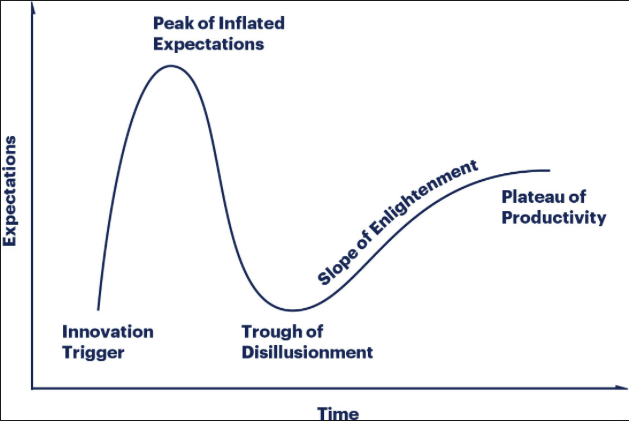
Today is Thanksgiving in the US, so first of all Happy Thanksgiving to all of Artificial Lawyer’s readers in America!
Second point, I was thinking about this important celebration in the US calendar and couldn’t help but make some parallels (albeit highly tenuous ones…) with the growth of the legal AI sector.
Although Thanksgiving as a celebration has evolved over the course of the last few hundred years, its core message seems to be about how a hearty band of people looking for a better world took a big risk and headed off to into a future that they had taken upon themselves to create.
As anyone around the world who remembers the story will recollect, the Pilgrim Fathers, who set off from England in 1620, did not find it easy going. First, although they knew that the shores of where they were headed were already occupied by other people they went anyway – and to put it delicately, that caused a few issues for all involved.
Second, when they got there, making a going concern of their settlement was not easy. There was a severe lack of resources despite being in what they had assumed would be a land of great opportunity. Some did not make it. And, as the story goes, they had to work closely with the incumbents, who’d been there for centuries, to survive.

But, they did survive, (and this is where the links start to get so tenuous that we can leave the historical analogy behind), and then prospered.
A group of religious dissenters looking to build a new world, along with a group of entrepreneurs looking for economic opportunities, had set something in motion that is today the world’s biggest economy and still the leader in technological innovation.
And this reminded me of the legal AI pioneers who have ventured forth too, with big dreams and hopes. Some are dissenters, tired of the old world of how law is done and believe there is a better way.
Others are not theoretical purists, but rather pragmatic entrepreneurs who quite rightly have seen that legal AI and automation of legal tasks has the potential to be a highly successful part of the legal economy – if not the future driving force in expanding that legal sector (e.g. through driving greater access to justice that will open up the huge untapped fields of un-met legal demand).
The Slope of Enlightenment
Now, we come racing back to the present and also have a stab at the near future, through the lens of the Gartner product cycle, which is: innovation trigger; peak of inflated expectations; followed by where we are now – the trough of disillusionment (although this seems to be a bit over the top in terms of language as few are really that unhappy) – and then onto the slope of enlightenment; and finally the total acceptance and normalisation of that new tech/product and we reach the plateau of productivity……after which point something else comes along and disrupts this happy plateau where little new improvement can be made. And so on unto infinity….

Where we are now is a bit like where the first colonists from Europe must have felt as they realised that the ‘New World’ was not going to be easy. Expectations have not been wholly met.
And to bring it back to the land of AI, it has turned out…..surprise…! that the words MACHINE LEARNING meant what they said.
Legal AI systems need teaching, just like bleary-eyed young trainee lawyers need teaching and training and help and attention and your time and your money.
AI and automation systems of all kinds need your help to work. They are about as much finished products as a set of Ikea shelves. But, even worse, the final version of ‘what they should look like’ is also in your hands. I.e. these are Ikea shelves that come with parts and an Allen key, but without any plans, because it’s up to you to make this product into what you want it to be.
There are several reasons (see the forthcoming AL Product Reviews) why not all people have had their expectations met with legal AI tools (though many have as they had more down to earth expectations to start with), but perhaps the greatest one is that is that they are not perfect, they are not ‘finished products’ – though, to be fair to the AI companies, few have ever said that they were….hence the relevance of those words MACHINE LEARNING again.
However, is this the end of the legal AI colonies? Will the legal world throw them back into the cold ocean of endeavour from which they came because of these unmet dreams? No, not for a moment.
Why? Because the truth is legal AI tools are now firmly embedded in a large number of law firms and many are now getting to understand what they really can do, how to use them and how they add value.
Things Can Only Get Better
As D:Ream once sang, ‘Things can only get better’….at least if you’re an optimist as AL is.
Although, maybe this isn’t just about optimism. It’s also about history. Personally, I find more lessons about the future by looking at the past. While futurism can be a lot of fun – and when done well can be amazingly useful – I prefer to look at history and try to see what it can tell us about our present and the immediate future we are moving into.
If legal AI and the automation of certain aspects of the ‘means of legal production’ (to repeat my favourite saying) is similar to other movements in the history of innovation, then we can all stop worrying about words such as ‘hype’ and ‘disillusionment’, and instead focus on the basic realities:
- There is a technology now available, that despite its non-magical qualities, that despite its need for substantial human input to make valuable, does actually work and provides value.
- Many, many law firms and corporates around the planet have now started using this tech, for a variety of tasks, with doc review likely the most frequent use case, though there are plenty of other use cases.
- That although the law firms using this tech are using it on a very, very small amount of all the work where it could be used, this is not a defeat, but instead a beginning.
- Many of the law firms using this tech have only been doing so for about two years or less. That means we are at an incredibly early stage still with huge room to grow.
- If we have moved through the peak of inflated expectations within two years and the legal AI sector is looking in great health still (which it is….just ask companies such as Seal Software and Kira Systems about their revenue growth over the last 12 months) – then we are in a great position. I.e. we’ve hit the dip really fast and are well able to now move out of it really quickly too and into….
…..the slope of enlightenment.
This slope refers to the very real journey we all make as we learn the pragmatic day to day needs, challenges and benefits of anything new. We get carried away, we hit reality, we get sad as the honeymoon ends, then we find a new happiness as our understanding grows and as we grow. The same is true for legal AI.
In short, the future is bright, the future is AI, and Artificial Lawyer is delighted to be on this great journey with you all. And it’s only just begun!
By Richard Tromans, Founder, Artificial Lawyer